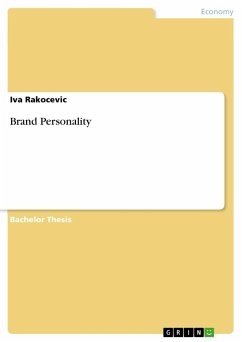In a time where markets are marked by the exchangability of products, the question is how can marketers create powerful brands in establishing a long-term connection with the brand. The following thesis is seeking to provide empirical support for the determinants of strong brand connections by testing a series of hypotheses using an experimental research approach with 130 participants. The thesis didn't find support for the direct impact of a match between brand-and consumer personality (consumer-brand congruence) on the brand connection. However the findings indicate that the other determinants like involvement, investment and satisfaction with the brand influence brand connection. Involvement stands for the relevance of the brand to the consumer based on his fundamental value system. Therefore if the brand personality incoporates the consumer's own value system, he is more likely to connect to the brand. Furthermore a consumer is more likely to invest in a brand that is closer to his own self and his fundemental value system. Thirdly a consumer that is satisfied with the brand is more like to identify with the brand, leading to a stronger brand relationship. The paper conceptually introduces brand-consumer congruence and the other determinants of the brand connection. Never the less due to its findings it challenges the concept of brand-consumer congruence.








